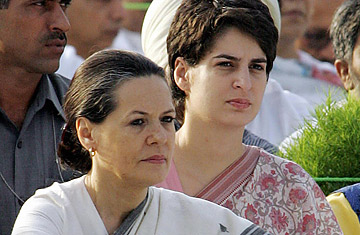
Chairperson of the United Progressive Alliance government and Congress Party President Sonia Gandhi, left, sits with her daughter Priyanka Gandhi.
The concepts of forgiveness and reconciliation are as old as religion itself. All the world's great faiths preach forgiveness, from Christianity's parable of the Prodigal son to Islam's tenet that Allah is the source of all forgiveness. Famous instances of forgiveness pepper recent history, from a dying Mahatma Gandhi forgiving his assassin to Pope John Paul II making peace with his own would-be killer in a prison cell meeting two years after his attempted assassination. There's Nelson Mandela, who exited prison after 27 years only to preach forgiveness and unity with his erstwhile captors. Now, perhaps, we can add the example of Priyanka Gandhi, daughter of assassinated former Indian Prime Minister Rajiv Gandhi.
Priyanka was still a teenager when her father was murdered, torn apart in a suicide bombing by a Tamil activist angry about India's involvement in the civil war in neighboring Sri Lanka. According to friends of the family quoted later, Priyanka cared for her distraught mother Sonia and helped make preparations for the funeral.
Last month, 17 years on, the daughter of India's most famous family sought out a woman serving a life sentence for her role in the assassination conspiracy. It was a private affair, "a purely personal visit that I undertook completely on my own initiative," Priyanka said in a statement released after news of the meeting with Nalini Murugan leaked to the Indian press earlier this week. "I would be deeply grateful if this could be respected."
According to lawyers for Murugan (or simply Nalini, as she is known in the south Indian fashion), the two women both wept when they met. Toward the end of their meeting, they compared stories about their children's births (both have had caesareans) and even swapped small gifts, though neither revealed what they were. Nalini, whose initial death sentence was commuted to life imprisonment a few years ago after intervention by Sonia Gandhi, now the president of the ruling Congress Party, apparently found Priyanka's visit life changing. According to the Times of India Nalini told her brother P. S. Bhagyanathan that she feels as if "all my sins have been washed off by Priyanka's visit... I feel she has pardoned me by calling on me at the prison... I am indebted to her all my life." Whether Priyanka explicitly offered forgiveness will probably remain between them. In her statement, Priyanka said that "meeting with Nalini was my way of coming to peace with [the] violence and loss that I have experienced."
It's not easy to forgive. A few years ago one woman's painful struggle to forgive the killers of her child sparked an essay that I wrote for TIME in which I argued that forgiveness was only a part of coming to terms with a tragedy. Justice is another, the need for the transgressor to admit and take responsibility for his or her actions. Something of that same dynamic can be seen in Pope Benedict's dramatic, though private, meeting with victims of priestly sexual abuse in the United States.
Forgiveness can be liberating, a way to peace. Hinduism teaches that forgiving is not a sign of weakness, but of power. Priyanka's approach to Nalini "is a great thing, very sensitive, very human," says Radha Bhatt, who heads the Gandhi Peace Foundation, which studies and teaches the values of Mahatma Gandhi (who was no relation to the Nehru-Gandhi family to which Priyanka belongs). "If the people of this earth could learn how to cry, to bring back tears in the eyes... that would help because tears in the eyes is a real human virtue." Forgive, said John Paul II, and you will be forgiven.
To this day, however, Nalini maintains her innocence in the assassination conspiracy, claiming she arrived at the site after the explosion and had nothing to do with its planning. So perhaps Priyanka was not trying to forgive so much as she was trying not to hate — and their meeting was a very private gesture that, after becoming public, has come to appear heartbreakingly heroic. "I don't believe in anger, hatred, and violence," Priyanka said simply in her statement. "And I refuse to allow it to overpower my life."
